外研版(2019)选择性必修 第二册Unit 5 A delicate world Listening & Speaking课件(共20张PPT,内镶嵌音频)
文档属性
| 名称 | 外研版(2019)选择性必修 第二册Unit 5 A delicate world Listening & Speaking课件(共20张PPT,内镶嵌音频) | 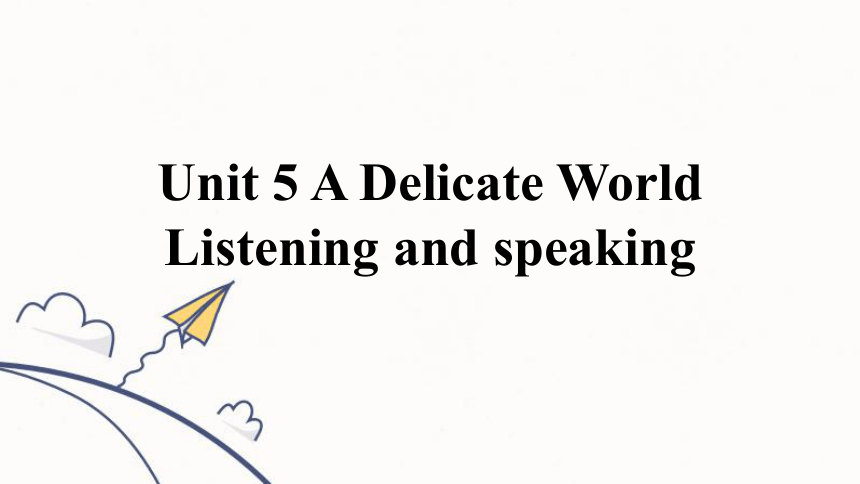 | |
| 格式 | pptx | ||
| 文件大小 | 6.4MB | ||
| 资源类型 | 教案 | ||
| 版本资源 | 外研版(2019) | ||
| 科目 | 英语 | ||
| 更新时间 | 2024-10-28 21:21:00 | ||
图片预览

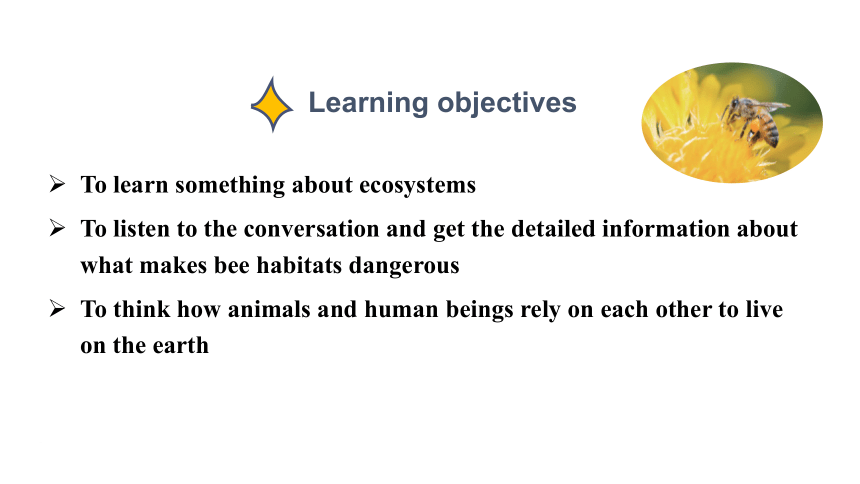
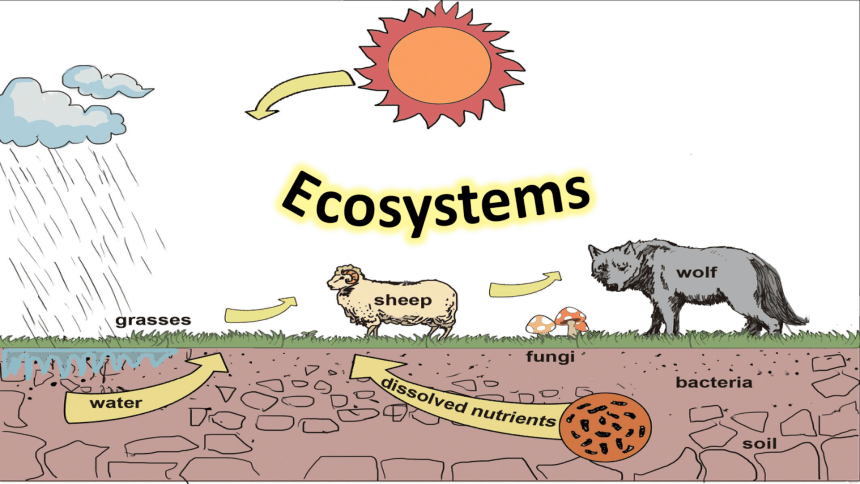
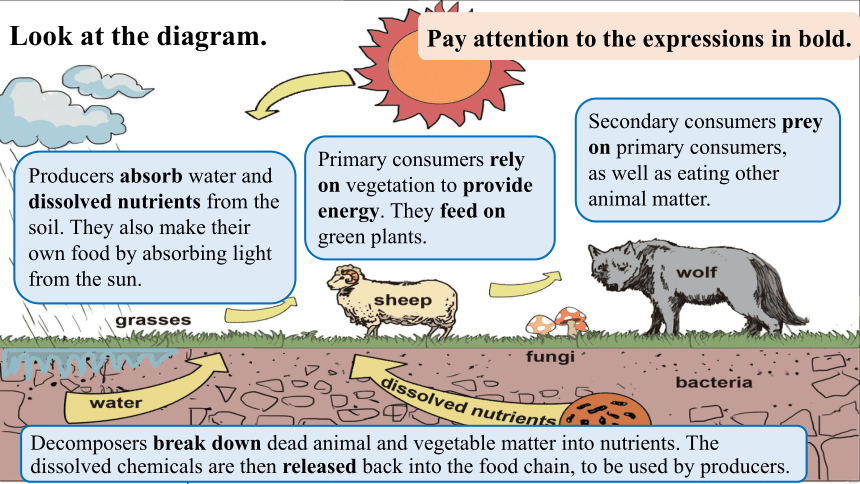
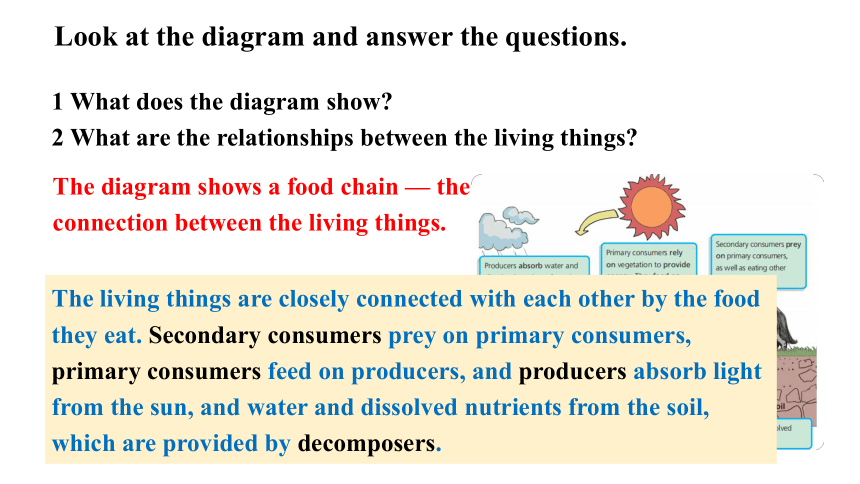
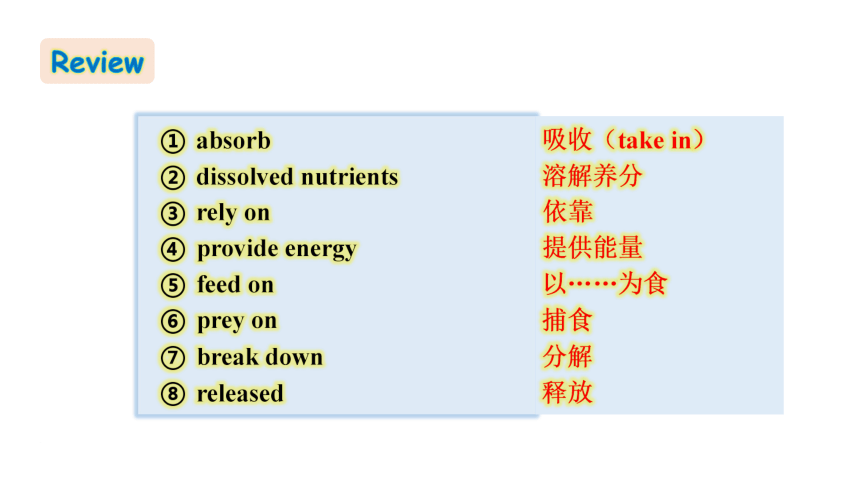

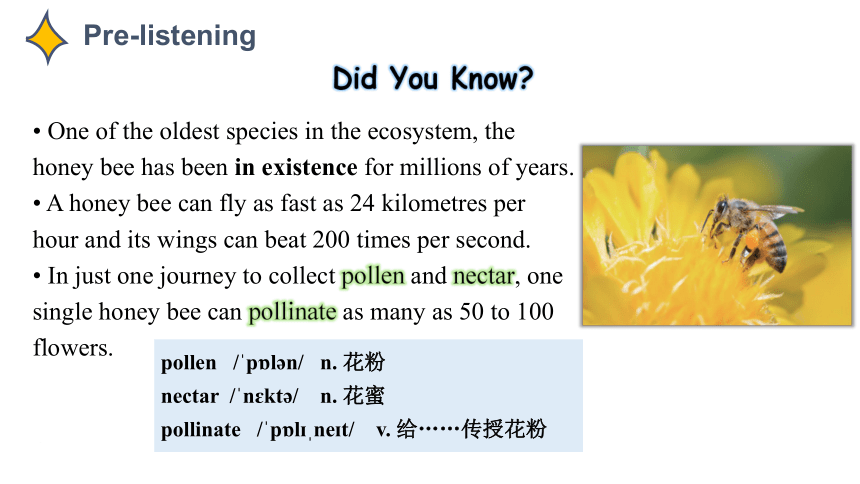
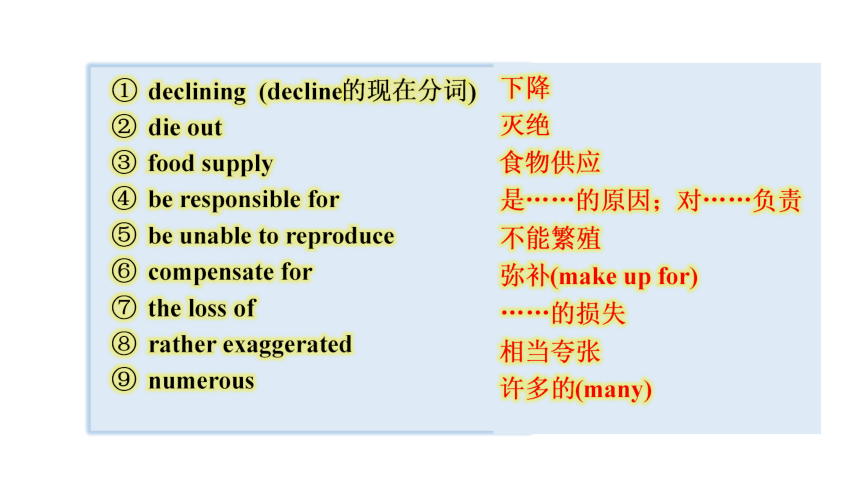
文档简介
(共20张PPT)
Unit 5 A Delicate World
Listening and speaking
To learn something about ecosystems
To listen to the conversation and get the detailed information about what makes bee habitats dangerous
To think how animals and human beings rely on each other to live on the earth
Learning objectives
Ecosystems
Producers absorb water and dissolved nutrients from the soil. They also make their own food by absorbing light from the sun.
Primary consumers rely on vegetation to provide energy. They feed on
green plants.
Secondary consumers prey on primary consumers,
as well as eating other
animal matter.
Decomposers break down dead animal and vegetable matter into nutrients. The dissolved chemicals are then released back into the food chain, to be used by producers.
Look at the diagram.
Pay attention to the expressions in bold.
1 What does the diagram show
2 What are the relationships between the living things
Look at the diagram and answer the questions.
The diagram shows a food chain — the connection between the living things.
The living things are closely connected with each other by the food they eat. Secondary consumers prey on primary consumers, primary consumers feed on producers, and producers absorb light from the sun, and water and dissolved nutrients from the soil, which are provided by decomposers.
absorb
dissolved nutrients
rely on
provide energy
feed on
prey on
break down
released
吸收(take in)
溶解养分
依靠
提供能量
以……为食
捕食
分解
释放
Review
Complete the passage with the correct form of the words and expressions in Activity 5.
In a woodland ecosystem, trees and other plants are producers. They
1____________ water, and take in nutrients from the soil and energy from the sun. Insects are an example of a primary consumer. They 2 ____________ the producers to provide food for them, and are 3 ____________ by secondary consumers: small mammals and birds. They 4 ____________ the primary consumers. Fungi and bacteria are decomposers. They 5 ____________ animal waste and the remains of living things. The chemicals these decomposers 6 ____________ fertilise the soil and give the plants the nutrients they need to grow.
absorb
rely on
fed on
break down
prey on
release
One of the oldest species in the ecosystem, the honey bee has been in existence for millions of years.
A honey bee can fly as fast as 24 kilometres per hour and its wings can beat 200 times per second.
In just one journey to collect pollen and nectar, one single honey bee can pollinate as many as 50 to 100 flowers.
Did You Know
pollen / p l n/ n. 花粉
nectar / n kt / n. 花蜜
pollinate / p l ne t/ v. 给……传授花粉
Pre-listening
declining (decline的现在分词)
die out
food supply
be responsible for
be unable to reproduce
compensate for
the loss of
rather exaggerated
numerous
下降
灭绝
食物供应
是……的原因;对……负责
不能繁殖
弥补(make up for)
……的损失
相当夸张
许多的(many)
looking on the bright side
according to statistics
a combination of
due to
damage to
caused by
main cause
in that case
看好的一面
根据统计数据
……的结合
由于
损害,破坏
由……导致
主要原因
在那种情况下
1 Bees are very important to our food supply because they provide honey.
2 The bee population is declining.
3 Without bees, humans would die out.
4 All human crops depend on bees for pollination.
5 If bees became extinct, other insects could pollinate enough crops.
6 Humans are responsible for the decline in the bee population.
Listen to the conversation and choose the true statements.
While-listening
Listen again and complete the flow chart.
A combination of things damages bee habitats, mainly 1 ______________________________.
The bee population is 2 _ _______________ . According to statistics, bee numbers in the US 3 _______________________ in just one year.
pesticides and climate change
declining very quickly
have fallen by 17%
Without bees, crops would 4 __________________________. 5 _____________ would not be able to compensate for the loss of bees, because 6 ________________________________________ of the species of crops.
Animals that live on the crops 7 _______________.
Humans have nothing to eat and die out.
be unable to reproduce
Other insects
bees are responsible for pollinating about 70%
would die out
Meg: Hey Ollie, have you heard that the bee population is declining
Ollie: No, I haven’t. But, thinking about it, I hardly ever see bees these days. When I was little, they seemed to be everywhere!
Meg: If bees die out, humans will die out too.
Ollie: What ! You must be kidding! I don’t believe it!
Meg: It’s a fact!! I watched a nature documentary all about it the other evening. Bees are very important to our food supply.
Ollie: How can that be possible Humans won’t die out just because there’s no honey!
Tapescripts
Meg: Bees don’t just make honey. Don’t forget that bees are also responsible for pollinating plants. Without them, crops would be unable to reproduce.
Ollie: But surely there are other ways of getting these crops to reproduce. Does it have to be bees
Meg: Well, there are other insects that pollinate plants, but it’s unlikely that they would be able to fully compensate for the loss of bees. Bees are responsible for pollinating about 70% of the species of crops.
Ollie: Are you sure about that data It sounds rather exaggerated.
Meg: Watch the documentary and check it out for yourself if you don’t believe me. Without bees, numerous plant species would die out. Animals that live on the crops would die out, and we wouldn’t have enough to eat.
Ollie: Seriously That’s scary! But looking on the bright side, there are millions and millions of bees. They’re not going to die out any time soon.
Meg: I’m afraid you’re wrong. The bee population is declining very quickly. According to statistics, bee numbers in the US have fallen by 17% in just one year.
Ollie: Gosh! What caused that
Meg: A combination of things, really, but it’s mainly due to damage to their habitats caused by pesticides and climate change.
Ollie: So human activity is the main cause
Meg: That’s right.
Ollie: Well, in that case, we’d better do something before it’s too late.
Complete the boxes with the expressions from the conversation.
You must be kidding!
I don't believe it!
It's a fact!
Don't forget that…
Are you sure about…
Check it out for yourself…
According to statistics…
Expressing doubt
Responding to doubt
1 2 5
3 4 6 7
Post-listening
Pair work
Work in pairs. Talk about what would happen to the ecosystem if another species died out. Use the words and expressions in this section.
Unit 5 A Delicate World
Listening and speaking
To learn something about ecosystems
To listen to the conversation and get the detailed information about what makes bee habitats dangerous
To think how animals and human beings rely on each other to live on the earth
Learning objectives
Ecosystems
Producers absorb water and dissolved nutrients from the soil. They also make their own food by absorbing light from the sun.
Primary consumers rely on vegetation to provide energy. They feed on
green plants.
Secondary consumers prey on primary consumers,
as well as eating other
animal matter.
Decomposers break down dead animal and vegetable matter into nutrients. The dissolved chemicals are then released back into the food chain, to be used by producers.
Look at the diagram.
Pay attention to the expressions in bold.
1 What does the diagram show
2 What are the relationships between the living things
Look at the diagram and answer the questions.
The diagram shows a food chain — the connection between the living things.
The living things are closely connected with each other by the food they eat. Secondary consumers prey on primary consumers, primary consumers feed on producers, and producers absorb light from the sun, and water and dissolved nutrients from the soil, which are provided by decomposers.
absorb
dissolved nutrients
rely on
provide energy
feed on
prey on
break down
released
吸收(take in)
溶解养分
依靠
提供能量
以……为食
捕食
分解
释放
Review
Complete the passage with the correct form of the words and expressions in Activity 5.
In a woodland ecosystem, trees and other plants are producers. They
1____________ water, and take in nutrients from the soil and energy from the sun. Insects are an example of a primary consumer. They 2 ____________ the producers to provide food for them, and are 3 ____________ by secondary consumers: small mammals and birds. They 4 ____________ the primary consumers. Fungi and bacteria are decomposers. They 5 ____________ animal waste and the remains of living things. The chemicals these decomposers 6 ____________ fertilise the soil and give the plants the nutrients they need to grow.
absorb
rely on
fed on
break down
prey on
release
One of the oldest species in the ecosystem, the honey bee has been in existence for millions of years.
A honey bee can fly as fast as 24 kilometres per hour and its wings can beat 200 times per second.
In just one journey to collect pollen and nectar, one single honey bee can pollinate as many as 50 to 100 flowers.
Did You Know
pollen / p l n/ n. 花粉
nectar / n kt / n. 花蜜
pollinate / p l ne t/ v. 给……传授花粉
Pre-listening
declining (decline的现在分词)
die out
food supply
be responsible for
be unable to reproduce
compensate for
the loss of
rather exaggerated
numerous
下降
灭绝
食物供应
是……的原因;对……负责
不能繁殖
弥补(make up for)
……的损失
相当夸张
许多的(many)
looking on the bright side
according to statistics
a combination of
due to
damage to
caused by
main cause
in that case
看好的一面
根据统计数据
……的结合
由于
损害,破坏
由……导致
主要原因
在那种情况下
1 Bees are very important to our food supply because they provide honey.
2 The bee population is declining.
3 Without bees, humans would die out.
4 All human crops depend on bees for pollination.
5 If bees became extinct, other insects could pollinate enough crops.
6 Humans are responsible for the decline in the bee population.
Listen to the conversation and choose the true statements.
While-listening
Listen again and complete the flow chart.
A combination of things damages bee habitats, mainly 1 ______________________________.
The bee population is 2 _ _______________ . According to statistics, bee numbers in the US 3 _______________________ in just one year.
pesticides and climate change
declining very quickly
have fallen by 17%
Without bees, crops would 4 __________________________. 5 _____________ would not be able to compensate for the loss of bees, because 6 ________________________________________ of the species of crops.
Animals that live on the crops 7 _______________.
Humans have nothing to eat and die out.
be unable to reproduce
Other insects
bees are responsible for pollinating about 70%
would die out
Meg: Hey Ollie, have you heard that the bee population is declining
Ollie: No, I haven’t. But, thinking about it, I hardly ever see bees these days. When I was little, they seemed to be everywhere!
Meg: If bees die out, humans will die out too.
Ollie: What ! You must be kidding! I don’t believe it!
Meg: It’s a fact!! I watched a nature documentary all about it the other evening. Bees are very important to our food supply.
Ollie: How can that be possible Humans won’t die out just because there’s no honey!
Tapescripts
Meg: Bees don’t just make honey. Don’t forget that bees are also responsible for pollinating plants. Without them, crops would be unable to reproduce.
Ollie: But surely there are other ways of getting these crops to reproduce. Does it have to be bees
Meg: Well, there are other insects that pollinate plants, but it’s unlikely that they would be able to fully compensate for the loss of bees. Bees are responsible for pollinating about 70% of the species of crops.
Ollie: Are you sure about that data It sounds rather exaggerated.
Meg: Watch the documentary and check it out for yourself if you don’t believe me. Without bees, numerous plant species would die out. Animals that live on the crops would die out, and we wouldn’t have enough to eat.
Ollie: Seriously That’s scary! But looking on the bright side, there are millions and millions of bees. They’re not going to die out any time soon.
Meg: I’m afraid you’re wrong. The bee population is declining very quickly. According to statistics, bee numbers in the US have fallen by 17% in just one year.
Ollie: Gosh! What caused that
Meg: A combination of things, really, but it’s mainly due to damage to their habitats caused by pesticides and climate change.
Ollie: So human activity is the main cause
Meg: That’s right.
Ollie: Well, in that case, we’d better do something before it’s too late.
Complete the boxes with the expressions from the conversation.
You must be kidding!
I don't believe it!
It's a fact!
Don't forget that…
Are you sure about…
Check it out for yourself…
According to statistics…
Expressing doubt
Responding to doubt
1 2 5
3 4 6 7
Post-listening
Pair work
Work in pairs. Talk about what would happen to the ecosystem if another species died out. Use the words and expressions in this section.
